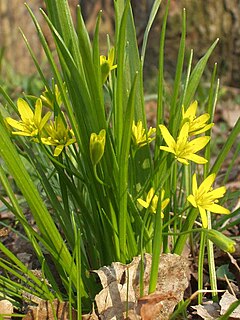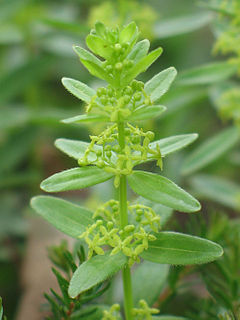
Satureja is a genus of aromatic plants of the family Lamiaceae, related to rosemary and thyme. It is native to North Africa, southern and southeastern Europe, the Middle East, and Central Asia. A few New World species were formerly included in Satureja, but they have all been moved to other genera. Several species are cultivated as culinary herbs called savory, and they have become established in the wild in a few places.

Marrubium is a genus of flowering plants in the family Lamiaceae, native to temperate regions of Europe, North Africa, and Asia as far east as the Xinjiang region of western China. A few species are also naturalized in North and South America.

Lamium (dead-nettles) is a genus of about 40–50 species of flowering plants in the family Lamiaceae, of which it is the type genus. They are all herbaceous plants native to Europe, Asia, and northern Africa, but several have become very successful weeds of crop fields and are now widely naturalised across much of the temperate world.

Ajuga, also known as bugleweed, ground pine, carpet bugle, or just bugle, is a genus of 40 species annual and perennial herbaceous flowering plants in the Ajugeae tribe of the mint family Lamiaceae, with most species native to Europe, Asia, and Africa, but also two species in southeastern Australia. They grow to 5–50 cm tall, with opposite leaves.

Alopecurus, or foxtail grass, is a common and widespread genus of plants in the grass family. It is common across temperate and subtropical parts of Eurasia, northern Africa, and the Americas, as well as naturalized in Australia and on various islands.

Gagea is a large genus of spring flowers in the lily family. It is found primarily in Eurasia with a few species extending into North Africa and North America.

Agropyron is a genus of Eurasian plants in the grass family), native to Europe and Asia but widely naturalized in North America.

Aegilops is a genus of Eurasian and North American plants in the grass family, Poaceae. They are known generally as goatgrasses. Some species are known as invasive weeds in parts of North America.

The Taman Peninsula is a peninsula in the present-day Krasnodar Krai of Russia, which borders the Sea of Azov to the North, the Strait of Kerch to the West and the Black Sea to the South.

Cetotherium is an extinct genus of baleen whales from the family Cetotheriidae.
The Urums, singular Urum are several groups of Turkic-speaking Greeks in the Crimea and Georgia.

Eremopyrum is a genus Eurasian and North African plants in the grass family. One species, Eremopyrum triticeum has become widely established as a weed in parts of North America.

Cetotheriidae is a family of baleen whales. The family is known to have existed from the Late Oligocene to the Early Pleistocene before going extinct. Although some phylogenetic studies conducted by Fordyce & Marx 2013 recovered the living pygmy right whale as a member of Cetotheriidae, making the pygmy right whale the only living cetotheriid, other authors either dispute this placement or recover Neobalaenidae as a sister group to Cetotheriidae.

Cruciata is a genus of flowering plants in the family Rubiaceae. It is found in Europe, northern Africa, and across southern and central Asia from Turkey to the western Himalaya and north to the Altay region of Siberia.

Crocus speciosus, with common name Bieberstein's crocus, is a species of flowering plant in the genus Crocus of the family Iridaceae. The plant is native to northern and central Turkey, the Caucasus, northern Iran, Crimea.
- Crocus speciosus subsp. ilgazensisB.Mathew - Turkey
- Crocus speciosus subsp. speciosus - Turkey, Iran, Caucasus, Crimea
- Crocus speciosus subsp. xantholaimosB.Mathew - Sinop Province in Turkey

Ziziphora are a genus of annual or perennial herbs or subshrubs in the family Lamiaceae. Ziziphora has aromatic leaves; they are found in open and often xeric habitats in Southern and Eastern Europe, North-West Africa and Asia to the Himalayas and Altai mountains.
Kurdalagonus is a genus of cetotheriid mysticete in the subfamily Cetotheriinae from the Miocene of the Russian Caucasus.
Eucetotherium is a genus of cetotheriid mysticete from Miocene (Tortonian) marine deposits in the Russian Caucasus.
The 276th Rifle Division was an infantry division of the Soviet Union's Red Army during World War II, formed twice.
The 271st Rifle Division was an infantry division of the Soviet Union's Red Army during World War II.


















